
The Integrated Energy Farm (IEF)
Overview of Projects
- Project IEF Adolphshof, Germany
- Project IEF Dedelsdorf, Germany
- Project IEF Kiga, Iran
- Project FAO Bulgaria
- Project Sustainable Regional Development Ochiso-Bebineha, Ghana
Adaptation of the IEF Concept in Bulgaria
Final Report, FAO-SREN-Project
Adaptation of the Integrated Energy Farm Concept for a Model Farm in Bulgaria
SREN-WG3, Ref. FA 12/452, FA 12/27.GEN(A), FA 12/45.GEN (2002)
N. El Bassam (Working Group 3, SREN) and J-M. Greef (FAO-SREN Coordinator)
ABSTRACT
Current approaches to energy are unsustainable and non-renewable. Implementing sustainable energy strategies is one of the most important levers humankind has for creating a sustainable world. Future energy policies should put more emphasis on developing the potential of energy sources, which should form the foundation of future global energy structure.
The FAO, in support of the Sustainable Rural Environment and Energy Network (SREN) has initiated this project to develop a concept for the Adaptation of The Integrated Energy Farm (IEF) for a Model Farm in Bulgaria.
In cooperation with the University of Rousse, the Municipality of Rousse and the NGO Civil Association for Management of Natural Resources and Environmental Promotion in Bulgaria as well as other members of the Working Group 3 of SREN, the Concept has been accomplished and a proposal for implementation has been worked out.
The project site, Obraszov Chiflik Farm, 7 km far from the City of Rousse, has been identified by the Bulgarian partner for the implementation of the Integrated Energy Farm. It consists of an experimental farm, Agricultural School and private farms with a total population of about 1000 people.
During the project preparation phases, 3 workshops: 1 in Bulgaria, 1 in Germany and 1 in Denmark have been conducted.
The project will contribute to a sustainable development of rural regions in Bulgaria and to reduce the immigration rate by creating a new opportunities for employment as well for training. It will improve the socio-economical and environmental situation of the farmers and the region.
Project partners have been identified. The total costs of the project amounts to 753.000 EURO. These costs will be recovered within 6 years In case of the implementation.
INTRODUCTION
Current approaches to energy are unsustainable and non renewable. Furthermore energy is directly related to the most critical social issues which affect sustainable development: poverty, jobs, income levels, access to social services, gender disparity, population growth, agricultural production, climate change and environment quality and economic and security issues. Without adequate attention to the critical importance of energy to all these aspects, the global social, economical and environmental goals of sustainability can not be achieved. Indeed the magnitude of change needed is immense, fundamental and directly related to the energy produced and consumed nationally and internationally.
The key challenge to realizing these targets is to overcome the lack of commitment and to develop the political will to protect people and the natural resource base. Failure to take action will lead to continuing degradation of natural resources, increasing conflicts over scarce resources and widening gaps between rich and poor. We must act while we still have choices. Implementing sustainable energy strategies is one of the most important levers humankind has for creating a sustainable world. More than 2 billions people have no access to modern energy sources, most of them are living in rural areas. Food and fodder availability is very closely related to energy availability.
In order to meet challenges, the future energy policies should put more emphasis on developing the potential of energy sources, which should form the foundation of future global energy structure. In this context, the FAO in support of the Sustainable Rural Environment and Energy Network (SREN) is developing a concept for the optimization, evaluation, and implementation of integrated renewable energy sources for rural communities.
This project “Adaptation of the Integrated Energy Farm Concept for a Model Farm in Bulgaria” is a further step towards implementation of the IEF in order to improve the economic, social and environmental conditions in rural regions in Europe. Fig.1. indicates the major pathways of the IEF.
